Management Skills and Career Development Plan: A Detailed Report
VerifiedAdded on 2024/05/29
|23
|6072
|400
Report
AI Summary
This report provides a comprehensive analysis of management principles and practices, focusing on the roles of a developing manager. It compares different management styles, such as authoritative, participative, laissez-faire, and affiliative, within the context of Marriott and Hilton Hotels, highlighting the importance of adapting styles to enhance employee morale and productivity. The report also discusses essential leadership characteristics, including interpersonal and communication skills, confidence, values, and flexibility. Furthermore, it evaluates communication processes, differentiating between formal and informal, upward, downward, and horizontal communication, and examines the organizational cultures of Hilton and Marriott Hotels, emphasizing the impact of pragmatic and baseball team cultures on employee satisfaction and organizational goals. The study concludes with a career development plan, outlining strategies for personal and professional growth, and suggests improvements for future advancement. Desklib offers a platform for students to access this and other solved assignments to aid in their studies.
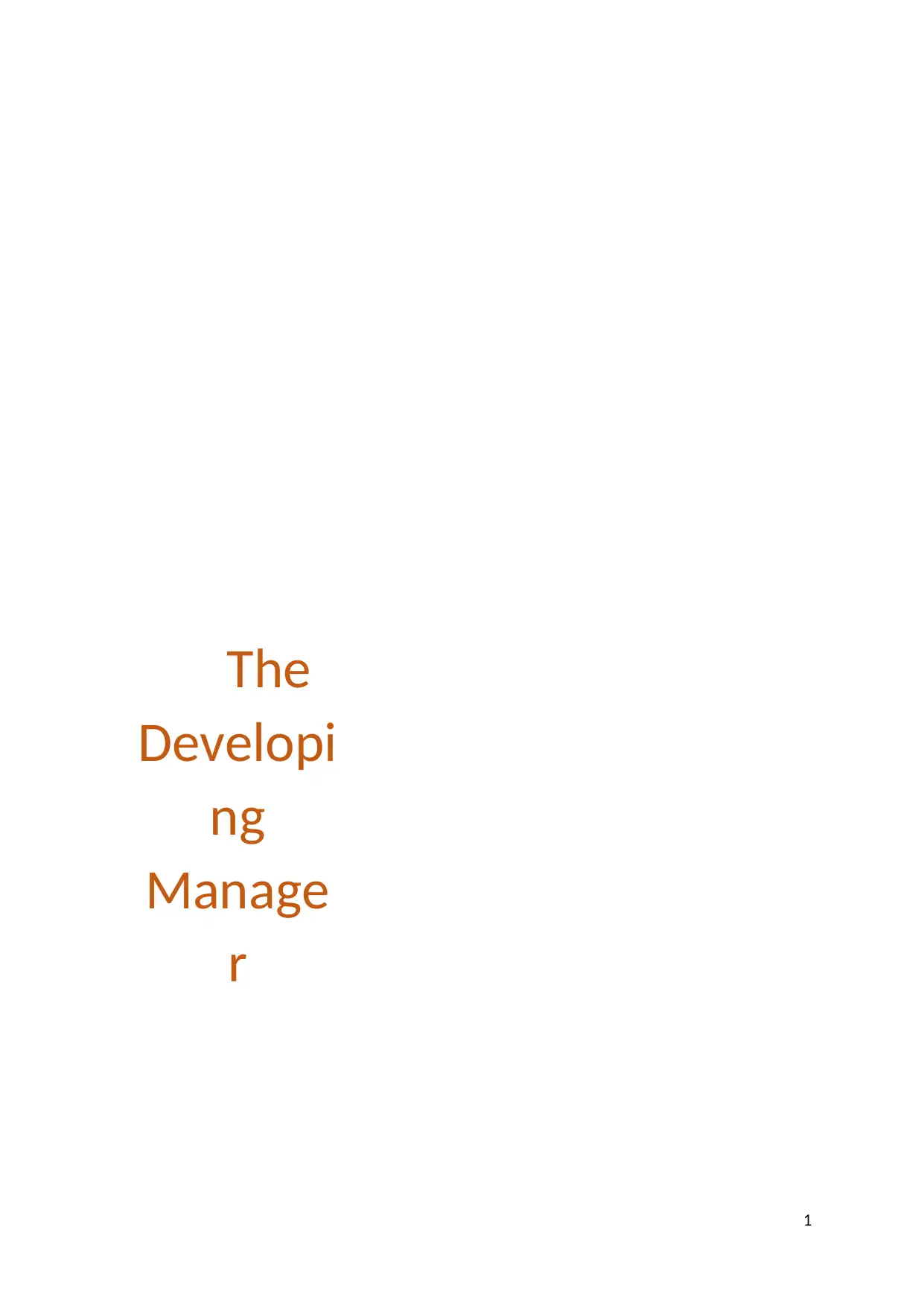
The
Developi
ng
Manage
r
1
Developi
ng
Manage
r
1
Paraphrase This Document
Need a fresh take? Get an instant paraphrase of this document with our AI Paraphraser
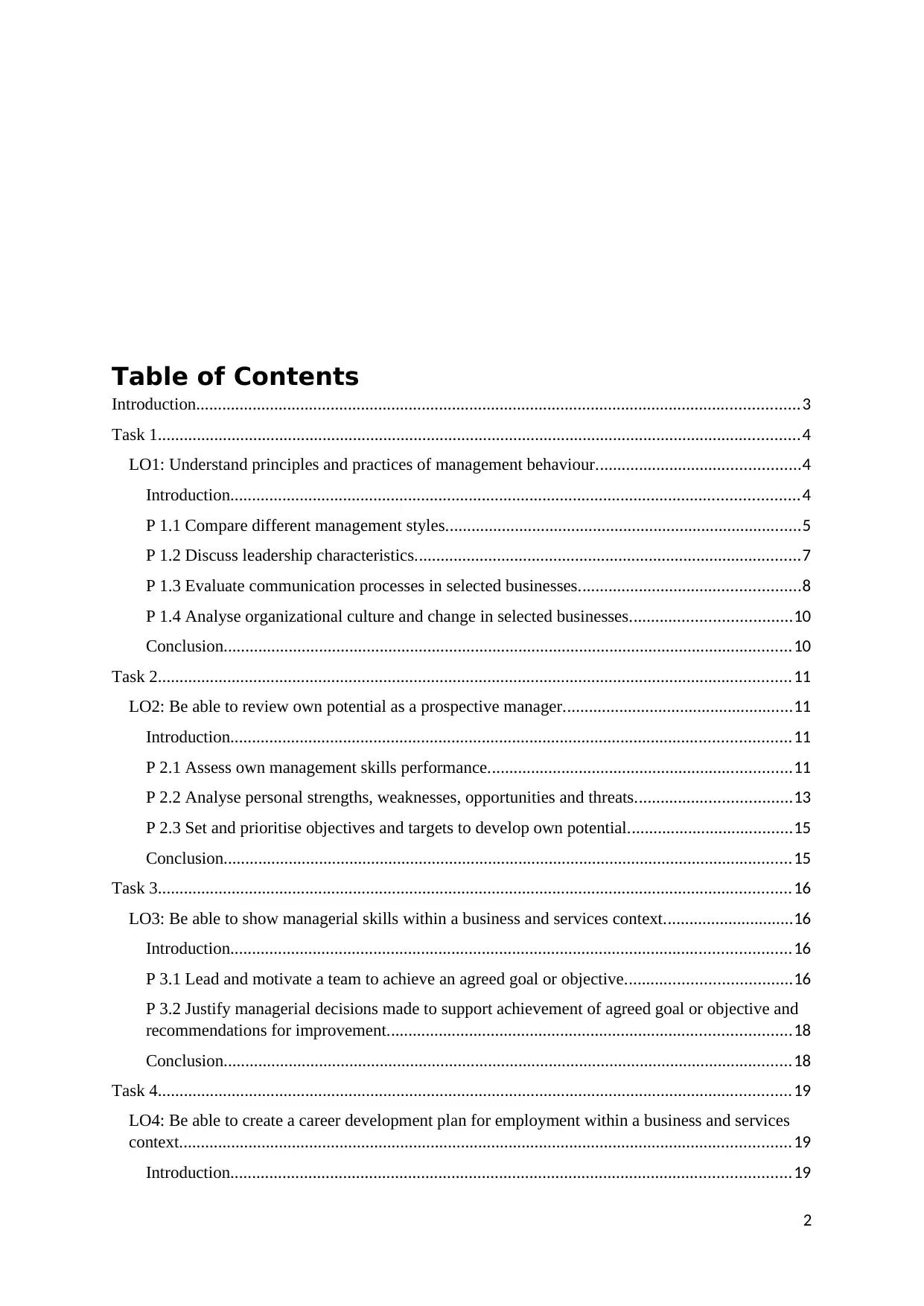
Table of Contents
Introduction...........................................................................................................................................3
Task 1....................................................................................................................................................4
LO1: Understand principles and practices of management behaviour...............................................4
Introduction...................................................................................................................................4
P 1.1 Compare different management styles..................................................................................5
P 1.2 Discuss leadership characteristics.........................................................................................7
P 1.3 Evaluate communication processes in selected businesses...................................................8
P 1.4 Analyse organizational culture and change in selected businesses.....................................10
Conclusion...................................................................................................................................10
Task 2..................................................................................................................................................11
LO2: Be able to review own potential as a prospective manager.....................................................11
Introduction.................................................................................................................................11
P 2.1 Assess own management skills performance......................................................................11
P 2.2 Analyse personal strengths, weaknesses, opportunities and threats....................................13
P 2.3 Set and prioritise objectives and targets to develop own potential......................................15
Conclusion...................................................................................................................................15
Task 3..................................................................................................................................................16
LO3: Be able to show managerial skills within a business and services context..............................16
Introduction.................................................................................................................................16
P 3.1 Lead and motivate a team to achieve an agreed goal or objective......................................16
P 3.2 Justify managerial decisions made to support achievement of agreed goal or objective and
recommendations for improvement.............................................................................................18
Conclusion...................................................................................................................................18
Task 4..................................................................................................................................................19
LO4: Be able to create a career development plan for employment within a business and services
context.............................................................................................................................................19
Introduction.................................................................................................................................19
2
Introduction...........................................................................................................................................3
Task 1....................................................................................................................................................4
LO1: Understand principles and practices of management behaviour...............................................4
Introduction...................................................................................................................................4
P 1.1 Compare different management styles..................................................................................5
P 1.2 Discuss leadership characteristics.........................................................................................7
P 1.3 Evaluate communication processes in selected businesses...................................................8
P 1.4 Analyse organizational culture and change in selected businesses.....................................10
Conclusion...................................................................................................................................10
Task 2..................................................................................................................................................11
LO2: Be able to review own potential as a prospective manager.....................................................11
Introduction.................................................................................................................................11
P 2.1 Assess own management skills performance......................................................................11
P 2.2 Analyse personal strengths, weaknesses, opportunities and threats....................................13
P 2.3 Set and prioritise objectives and targets to develop own potential......................................15
Conclusion...................................................................................................................................15
Task 3..................................................................................................................................................16
LO3: Be able to show managerial skills within a business and services context..............................16
Introduction.................................................................................................................................16
P 3.1 Lead and motivate a team to achieve an agreed goal or objective......................................16
P 3.2 Justify managerial decisions made to support achievement of agreed goal or objective and
recommendations for improvement.............................................................................................18
Conclusion...................................................................................................................................18
Task 4..................................................................................................................................................19
LO4: Be able to create a career development plan for employment within a business and services
context.............................................................................................................................................19
Introduction.................................................................................................................................19
2
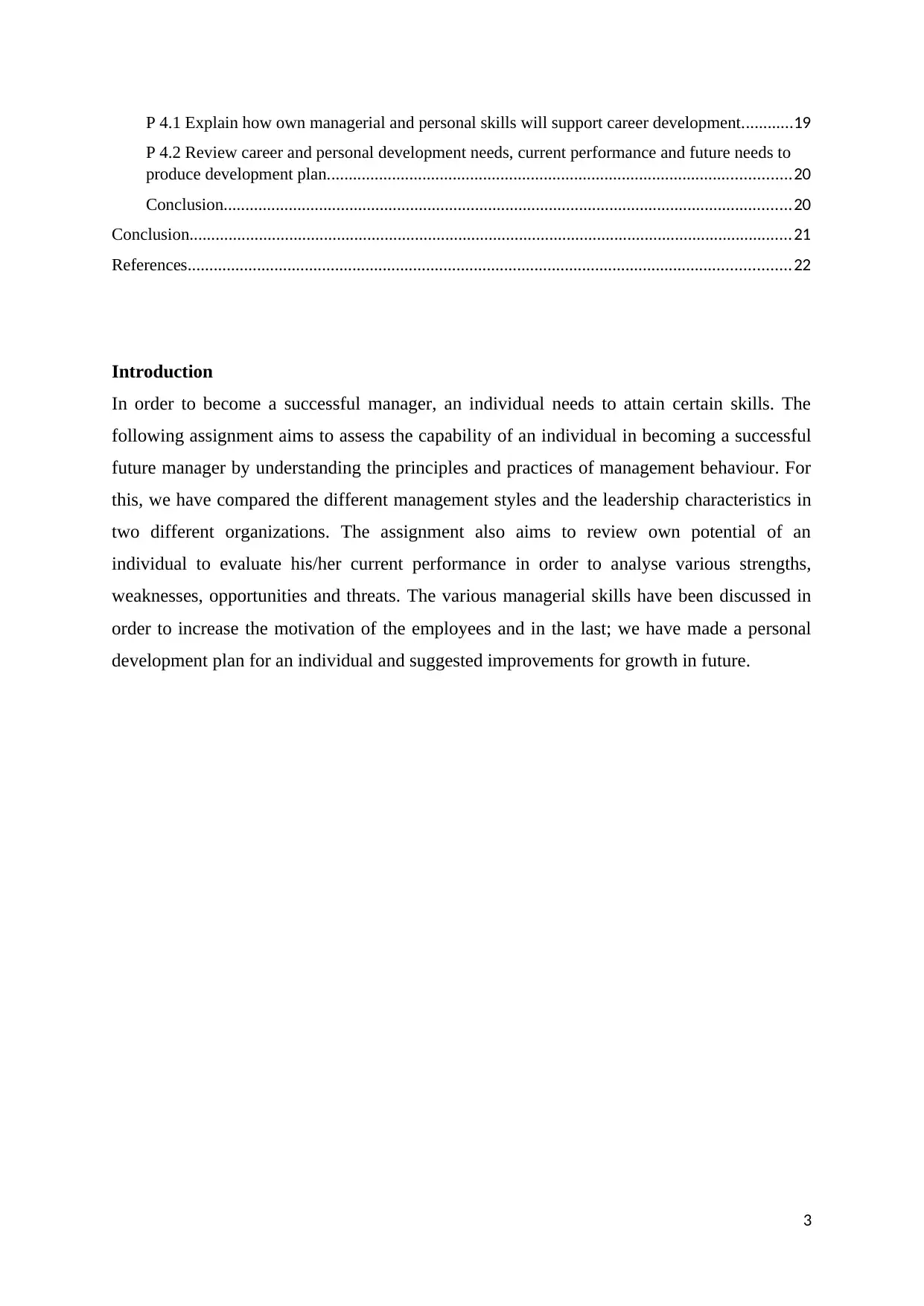
P 4.1 Explain how own managerial and personal skills will support career development............19
P 4.2 Review career and personal development needs, current performance and future needs to
produce development plan...........................................................................................................20
Conclusion...................................................................................................................................20
Conclusion...........................................................................................................................................21
References...........................................................................................................................................22
Introduction
In order to become a successful manager, an individual needs to attain certain skills. The
following assignment aims to assess the capability of an individual in becoming a successful
future manager by understanding the principles and practices of management behaviour. For
this, we have compared the different management styles and the leadership characteristics in
two different organizations. The assignment also aims to review own potential of an
individual to evaluate his/her current performance in order to analyse various strengths,
weaknesses, opportunities and threats. The various managerial skills have been discussed in
order to increase the motivation of the employees and in the last; we have made a personal
development plan for an individual and suggested improvements for growth in future.
3
P 4.2 Review career and personal development needs, current performance and future needs to
produce development plan...........................................................................................................20
Conclusion...................................................................................................................................20
Conclusion...........................................................................................................................................21
References...........................................................................................................................................22
Introduction
In order to become a successful manager, an individual needs to attain certain skills. The
following assignment aims to assess the capability of an individual in becoming a successful
future manager by understanding the principles and practices of management behaviour. For
this, we have compared the different management styles and the leadership characteristics in
two different organizations. The assignment also aims to review own potential of an
individual to evaluate his/her current performance in order to analyse various strengths,
weaknesses, opportunities and threats. The various managerial skills have been discussed in
order to increase the motivation of the employees and in the last; we have made a personal
development plan for an individual and suggested improvements for growth in future.
3
⊘ This is a preview!⊘
Do you want full access?
Subscribe today to unlock all pages.

Trusted by 1+ million students worldwide
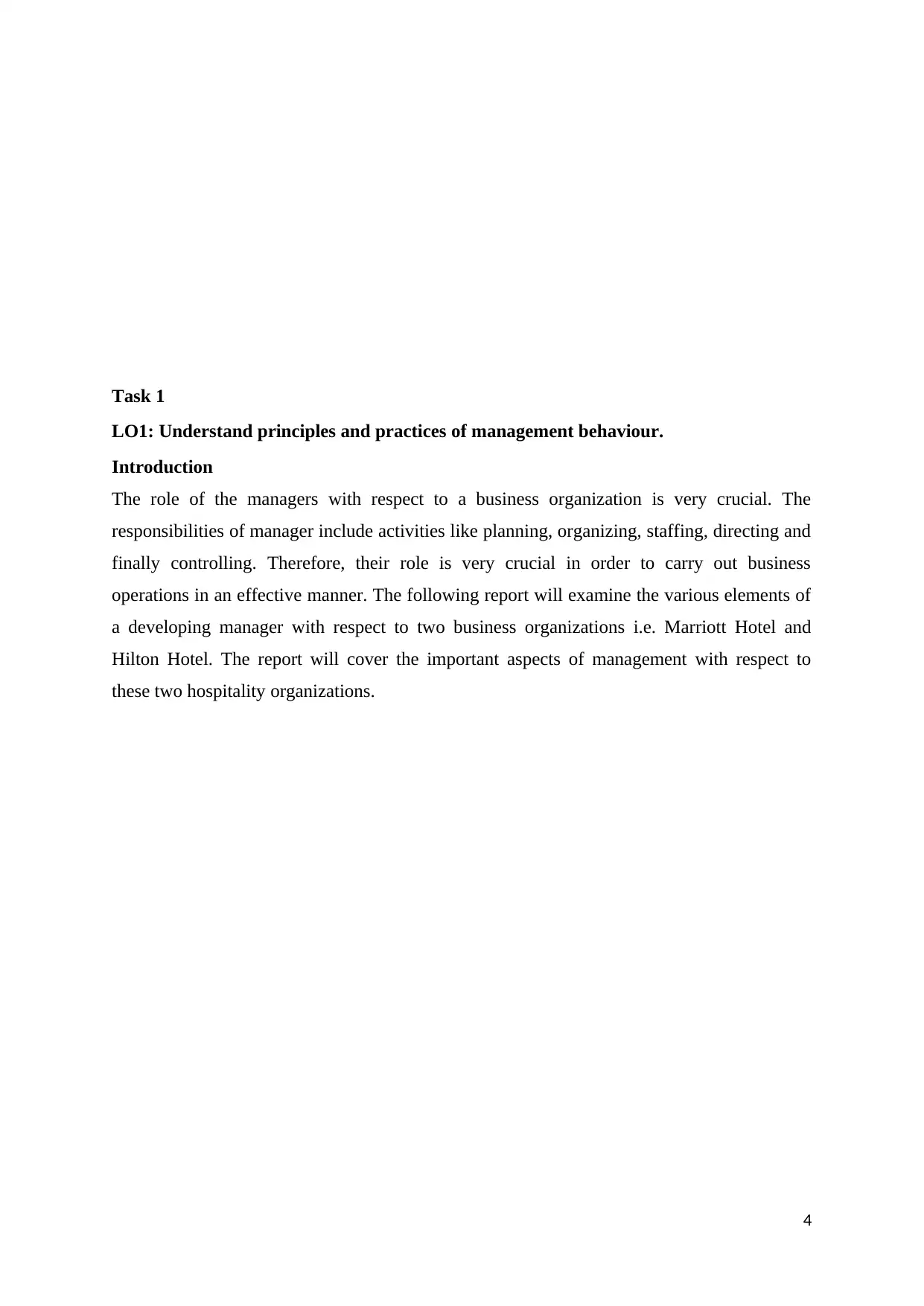
Task 1
LO1: Understand principles and practices of management behaviour.
Introduction
The role of the managers with respect to a business organization is very crucial. The
responsibilities of manager include activities like planning, organizing, staffing, directing and
finally controlling. Therefore, their role is very crucial in order to carry out business
operations in an effective manner. The following report will examine the various elements of
a developing manager with respect to two business organizations i.e. Marriott Hotel and
Hilton Hotel. The report will cover the important aspects of management with respect to
these two hospitality organizations.
4
LO1: Understand principles and practices of management behaviour.
Introduction
The role of the managers with respect to a business organization is very crucial. The
responsibilities of manager include activities like planning, organizing, staffing, directing and
finally controlling. Therefore, their role is very crucial in order to carry out business
operations in an effective manner. The following report will examine the various elements of
a developing manager with respect to two business organizations i.e. Marriott Hotel and
Hilton Hotel. The report will cover the important aspects of management with respect to
these two hospitality organizations.
4
Paraphrase This Document
Need a fresh take? Get an instant paraphrase of this document with our AI Paraphraser
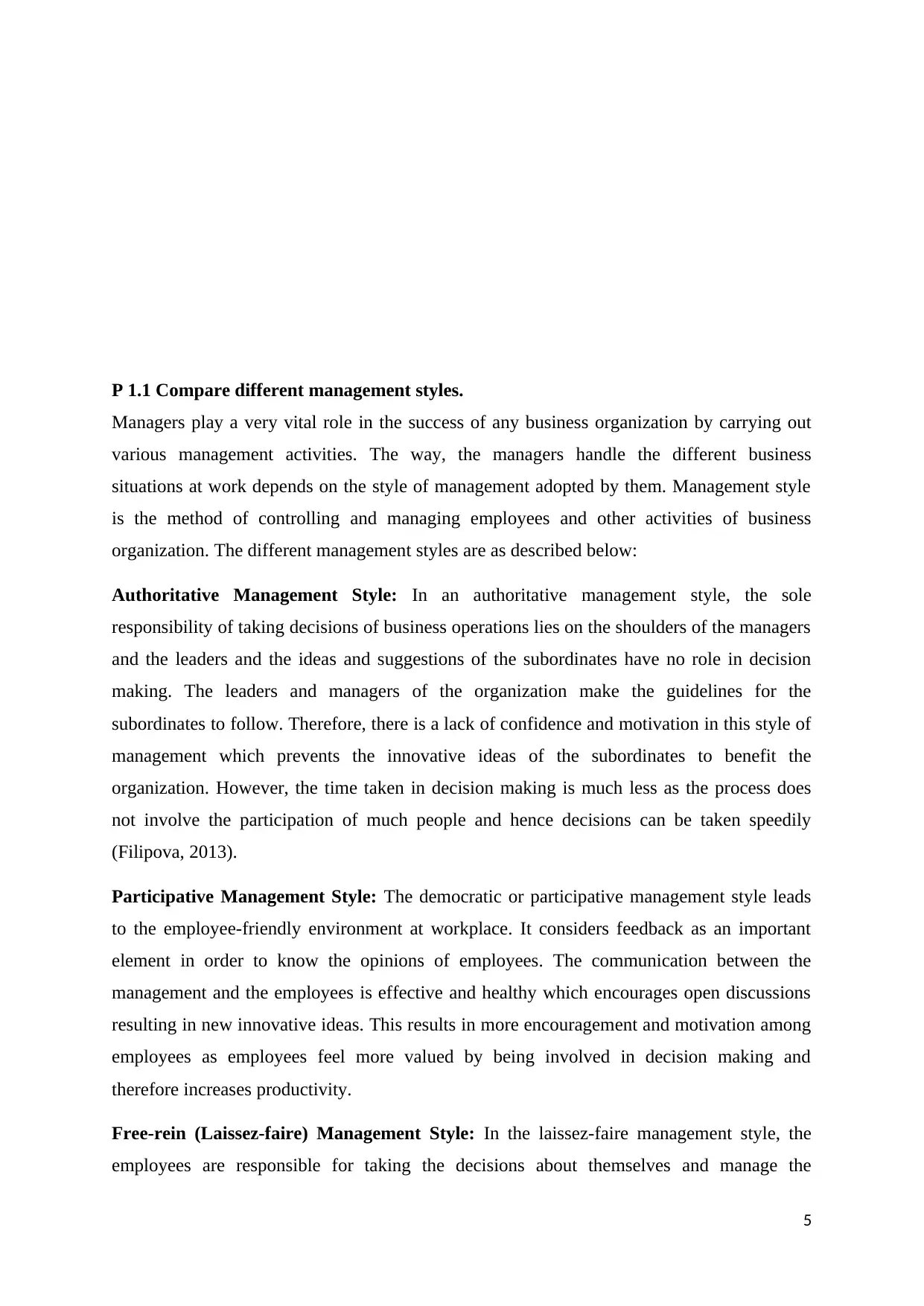
P 1.1 Compare different management styles.
Managers play a very vital role in the success of any business organization by carrying out
various management activities. The way, the managers handle the different business
situations at work depends on the style of management adopted by them. Management style
is the method of controlling and managing employees and other activities of business
organization. The different management styles are as described below:
Authoritative Management Style: In an authoritative management style, the sole
responsibility of taking decisions of business operations lies on the shoulders of the managers
and the leaders and the ideas and suggestions of the subordinates have no role in decision
making. The leaders and managers of the organization make the guidelines for the
subordinates to follow. Therefore, there is a lack of confidence and motivation in this style of
management which prevents the innovative ideas of the subordinates to benefit the
organization. However, the time taken in decision making is much less as the process does
not involve the participation of much people and hence decisions can be taken speedily
(Filipova, 2013).
Participative Management Style: The democratic or participative management style leads
to the employee-friendly environment at workplace. It considers feedback as an important
element in order to know the opinions of employees. The communication between the
management and the employees is effective and healthy which encourages open discussions
resulting in new innovative ideas. This results in more encouragement and motivation among
employees as employees feel more valued by being involved in decision making and
therefore increases productivity.
Free-rein (Laissez-faire) Management Style: In the laissez-faire management style, the
employees are responsible for taking the decisions about themselves and manage the
5
Managers play a very vital role in the success of any business organization by carrying out
various management activities. The way, the managers handle the different business
situations at work depends on the style of management adopted by them. Management style
is the method of controlling and managing employees and other activities of business
organization. The different management styles are as described below:
Authoritative Management Style: In an authoritative management style, the sole
responsibility of taking decisions of business operations lies on the shoulders of the managers
and the leaders and the ideas and suggestions of the subordinates have no role in decision
making. The leaders and managers of the organization make the guidelines for the
subordinates to follow. Therefore, there is a lack of confidence and motivation in this style of
management which prevents the innovative ideas of the subordinates to benefit the
organization. However, the time taken in decision making is much less as the process does
not involve the participation of much people and hence decisions can be taken speedily
(Filipova, 2013).
Participative Management Style: The democratic or participative management style leads
to the employee-friendly environment at workplace. It considers feedback as an important
element in order to know the opinions of employees. The communication between the
management and the employees is effective and healthy which encourages open discussions
resulting in new innovative ideas. This results in more encouragement and motivation among
employees as employees feel more valued by being involved in decision making and
therefore increases productivity.
Free-rein (Laissez-faire) Management Style: In the laissez-faire management style, the
employees are responsible for taking the decisions about themselves and manage the
5
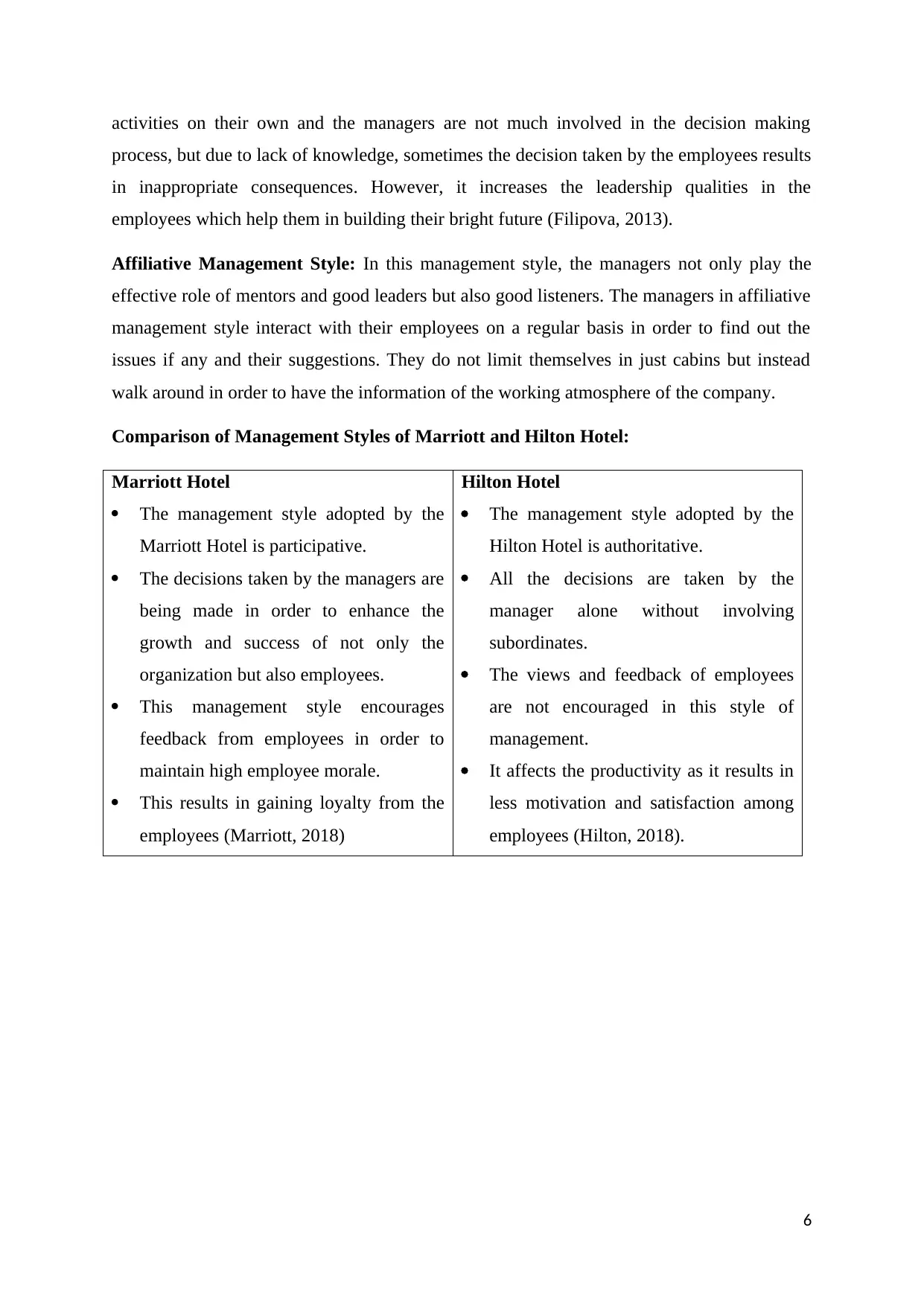
activities on their own and the managers are not much involved in the decision making
process, but due to lack of knowledge, sometimes the decision taken by the employees results
in inappropriate consequences. However, it increases the leadership qualities in the
employees which help them in building their bright future (Filipova, 2013).
Affiliative Management Style: In this management style, the managers not only play the
effective role of mentors and good leaders but also good listeners. The managers in affiliative
management style interact with their employees on a regular basis in order to find out the
issues if any and their suggestions. They do not limit themselves in just cabins but instead
walk around in order to have the information of the working atmosphere of the company.
Comparison of Management Styles of Marriott and Hilton Hotel:
Marriott Hotel
The management style adopted by the
Marriott Hotel is participative.
The decisions taken by the managers are
being made in order to enhance the
growth and success of not only the
organization but also employees.
This management style encourages
feedback from employees in order to
maintain high employee morale.
This results in gaining loyalty from the
employees (Marriott, 2018)
Hilton Hotel
The management style adopted by the
Hilton Hotel is authoritative.
All the decisions are taken by the
manager alone without involving
subordinates.
The views and feedback of employees
are not encouraged in this style of
management.
It affects the productivity as it results in
less motivation and satisfaction among
employees (Hilton, 2018).
6
process, but due to lack of knowledge, sometimes the decision taken by the employees results
in inappropriate consequences. However, it increases the leadership qualities in the
employees which help them in building their bright future (Filipova, 2013).
Affiliative Management Style: In this management style, the managers not only play the
effective role of mentors and good leaders but also good listeners. The managers in affiliative
management style interact with their employees on a regular basis in order to find out the
issues if any and their suggestions. They do not limit themselves in just cabins but instead
walk around in order to have the information of the working atmosphere of the company.
Comparison of Management Styles of Marriott and Hilton Hotel:
Marriott Hotel
The management style adopted by the
Marriott Hotel is participative.
The decisions taken by the managers are
being made in order to enhance the
growth and success of not only the
organization but also employees.
This management style encourages
feedback from employees in order to
maintain high employee morale.
This results in gaining loyalty from the
employees (Marriott, 2018)
Hilton Hotel
The management style adopted by the
Hilton Hotel is authoritative.
All the decisions are taken by the
manager alone without involving
subordinates.
The views and feedback of employees
are not encouraged in this style of
management.
It affects the productivity as it results in
less motivation and satisfaction among
employees (Hilton, 2018).
6
⊘ This is a preview!⊘
Do you want full access?
Subscribe today to unlock all pages.

Trusted by 1+ million students worldwide
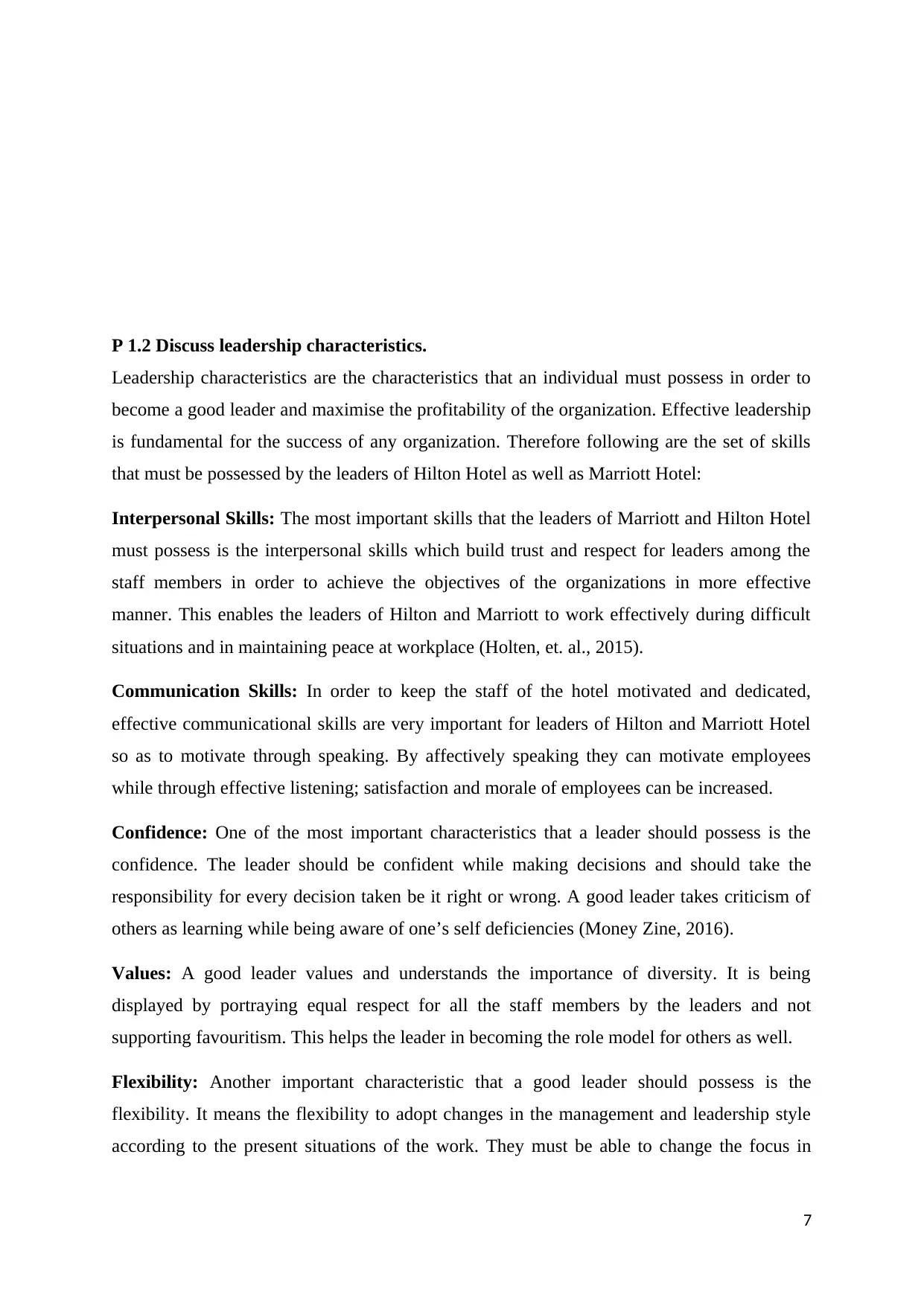
P 1.2 Discuss leadership characteristics.
Leadership characteristics are the characteristics that an individual must possess in order to
become a good leader and maximise the profitability of the organization. Effective leadership
is fundamental for the success of any organization. Therefore following are the set of skills
that must be possessed by the leaders of Hilton Hotel as well as Marriott Hotel:
Interpersonal Skills: The most important skills that the leaders of Marriott and Hilton Hotel
must possess is the interpersonal skills which build trust and respect for leaders among the
staff members in order to achieve the objectives of the organizations in more effective
manner. This enables the leaders of Hilton and Marriott to work effectively during difficult
situations and in maintaining peace at workplace (Holten, et. al., 2015).
Communication Skills: In order to keep the staff of the hotel motivated and dedicated,
effective communicational skills are very important for leaders of Hilton and Marriott Hotel
so as to motivate through speaking. By affectively speaking they can motivate employees
while through effective listening; satisfaction and morale of employees can be increased.
Confidence: One of the most important characteristics that a leader should possess is the
confidence. The leader should be confident while making decisions and should take the
responsibility for every decision taken be it right or wrong. A good leader takes criticism of
others as learning while being aware of one’s self deficiencies (Money Zine, 2016).
Values: A good leader values and understands the importance of diversity. It is being
displayed by portraying equal respect for all the staff members by the leaders and not
supporting favouritism. This helps the leader in becoming the role model for others as well.
Flexibility: Another important characteristic that a good leader should possess is the
flexibility. It means the flexibility to adopt changes in the management and leadership style
according to the present situations of the work. They must be able to change the focus in
7
Leadership characteristics are the characteristics that an individual must possess in order to
become a good leader and maximise the profitability of the organization. Effective leadership
is fundamental for the success of any organization. Therefore following are the set of skills
that must be possessed by the leaders of Hilton Hotel as well as Marriott Hotel:
Interpersonal Skills: The most important skills that the leaders of Marriott and Hilton Hotel
must possess is the interpersonal skills which build trust and respect for leaders among the
staff members in order to achieve the objectives of the organizations in more effective
manner. This enables the leaders of Hilton and Marriott to work effectively during difficult
situations and in maintaining peace at workplace (Holten, et. al., 2015).
Communication Skills: In order to keep the staff of the hotel motivated and dedicated,
effective communicational skills are very important for leaders of Hilton and Marriott Hotel
so as to motivate through speaking. By affectively speaking they can motivate employees
while through effective listening; satisfaction and morale of employees can be increased.
Confidence: One of the most important characteristics that a leader should possess is the
confidence. The leader should be confident while making decisions and should take the
responsibility for every decision taken be it right or wrong. A good leader takes criticism of
others as learning while being aware of one’s self deficiencies (Money Zine, 2016).
Values: A good leader values and understands the importance of diversity. It is being
displayed by portraying equal respect for all the staff members by the leaders and not
supporting favouritism. This helps the leader in becoming the role model for others as well.
Flexibility: Another important characteristic that a good leader should possess is the
flexibility. It means the flexibility to adopt changes in the management and leadership style
according to the present situations of the work. They must be able to change the focus in
7
Paraphrase This Document
Need a fresh take? Get an instant paraphrase of this document with our AI Paraphraser
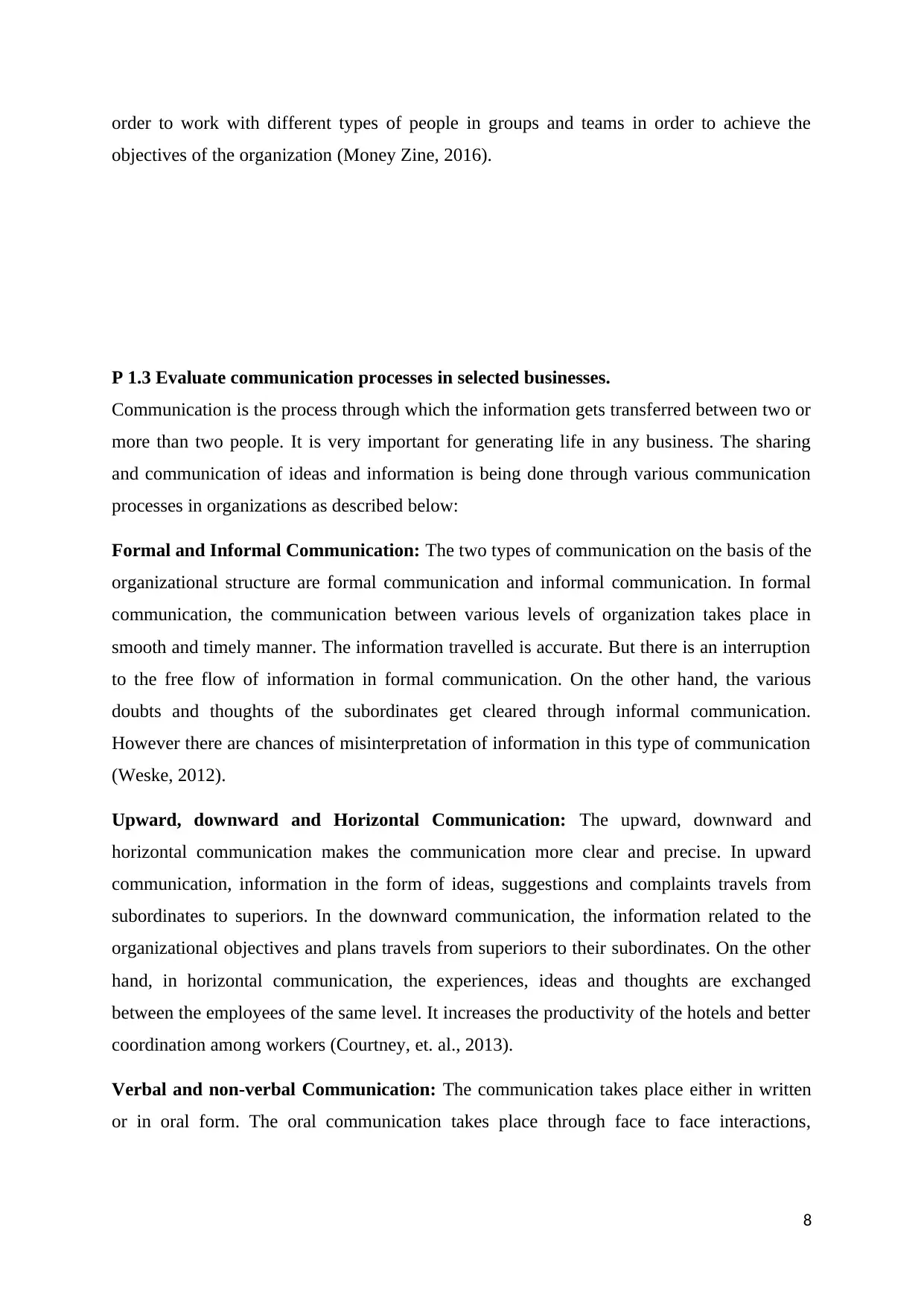
order to work with different types of people in groups and teams in order to achieve the
objectives of the organization (Money Zine, 2016).
P 1.3 Evaluate communication processes in selected businesses.
Communication is the process through which the information gets transferred between two or
more than two people. It is very important for generating life in any business. The sharing
and communication of ideas and information is being done through various communication
processes in organizations as described below:
Formal and Informal Communication: The two types of communication on the basis of the
organizational structure are formal communication and informal communication. In formal
communication, the communication between various levels of organization takes place in
smooth and timely manner. The information travelled is accurate. But there is an interruption
to the free flow of information in formal communication. On the other hand, the various
doubts and thoughts of the subordinates get cleared through informal communication.
However there are chances of misinterpretation of information in this type of communication
(Weske, 2012).
Upward, downward and Horizontal Communication: The upward, downward and
horizontal communication makes the communication more clear and precise. In upward
communication, information in the form of ideas, suggestions and complaints travels from
subordinates to superiors. In the downward communication, the information related to the
organizational objectives and plans travels from superiors to their subordinates. On the other
hand, in horizontal communication, the experiences, ideas and thoughts are exchanged
between the employees of the same level. It increases the productivity of the hotels and better
coordination among workers (Courtney, et. al., 2013).
Verbal and non-verbal Communication: The communication takes place either in written
or in oral form. The oral communication takes place through face to face interactions,
8
objectives of the organization (Money Zine, 2016).
P 1.3 Evaluate communication processes in selected businesses.
Communication is the process through which the information gets transferred between two or
more than two people. It is very important for generating life in any business. The sharing
and communication of ideas and information is being done through various communication
processes in organizations as described below:
Formal and Informal Communication: The two types of communication on the basis of the
organizational structure are formal communication and informal communication. In formal
communication, the communication between various levels of organization takes place in
smooth and timely manner. The information travelled is accurate. But there is an interruption
to the free flow of information in formal communication. On the other hand, the various
doubts and thoughts of the subordinates get cleared through informal communication.
However there are chances of misinterpretation of information in this type of communication
(Weske, 2012).
Upward, downward and Horizontal Communication: The upward, downward and
horizontal communication makes the communication more clear and precise. In upward
communication, information in the form of ideas, suggestions and complaints travels from
subordinates to superiors. In the downward communication, the information related to the
organizational objectives and plans travels from superiors to their subordinates. On the other
hand, in horizontal communication, the experiences, ideas and thoughts are exchanged
between the employees of the same level. It increases the productivity of the hotels and better
coordination among workers (Courtney, et. al., 2013).
Verbal and non-verbal Communication: The communication takes place either in written
or in oral form. The oral communication takes place through face to face interactions,
8
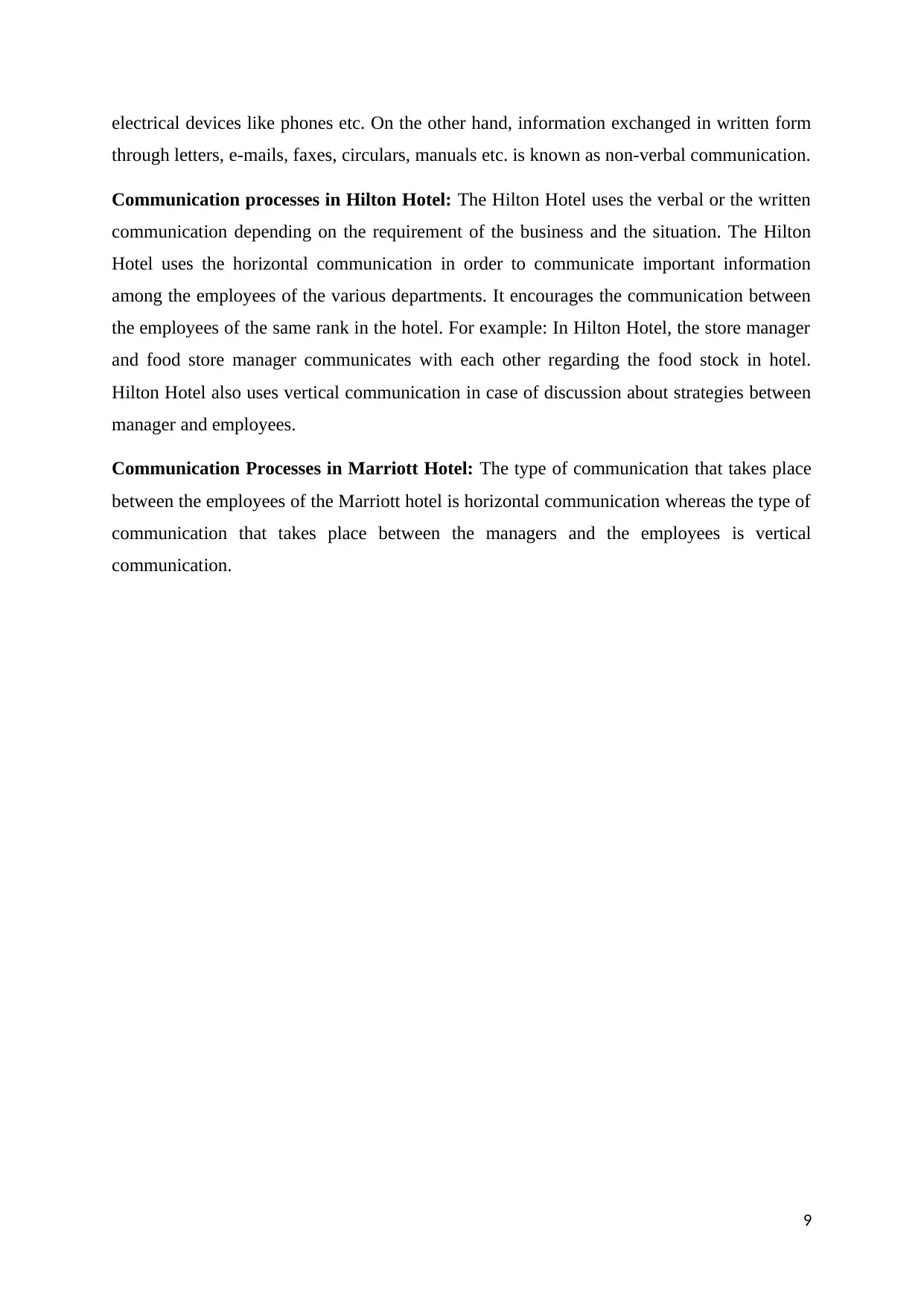
electrical devices like phones etc. On the other hand, information exchanged in written form
through letters, e-mails, faxes, circulars, manuals etc. is known as non-verbal communication.
Communication processes in Hilton Hotel: The Hilton Hotel uses the verbal or the written
communication depending on the requirement of the business and the situation. The Hilton
Hotel uses the horizontal communication in order to communicate important information
among the employees of the various departments. It encourages the communication between
the employees of the same rank in the hotel. For example: In Hilton Hotel, the store manager
and food store manager communicates with each other regarding the food stock in hotel.
Hilton Hotel also uses vertical communication in case of discussion about strategies between
manager and employees.
Communication Processes in Marriott Hotel: The type of communication that takes place
between the employees of the Marriott hotel is horizontal communication whereas the type of
communication that takes place between the managers and the employees is vertical
communication.
9
through letters, e-mails, faxes, circulars, manuals etc. is known as non-verbal communication.
Communication processes in Hilton Hotel: The Hilton Hotel uses the verbal or the written
communication depending on the requirement of the business and the situation. The Hilton
Hotel uses the horizontal communication in order to communicate important information
among the employees of the various departments. It encourages the communication between
the employees of the same rank in the hotel. For example: In Hilton Hotel, the store manager
and food store manager communicates with each other regarding the food stock in hotel.
Hilton Hotel also uses vertical communication in case of discussion about strategies between
manager and employees.
Communication Processes in Marriott Hotel: The type of communication that takes place
between the employees of the Marriott hotel is horizontal communication whereas the type of
communication that takes place between the managers and the employees is vertical
communication.
9
⊘ This is a preview!⊘
Do you want full access?
Subscribe today to unlock all pages.

Trusted by 1+ million students worldwide
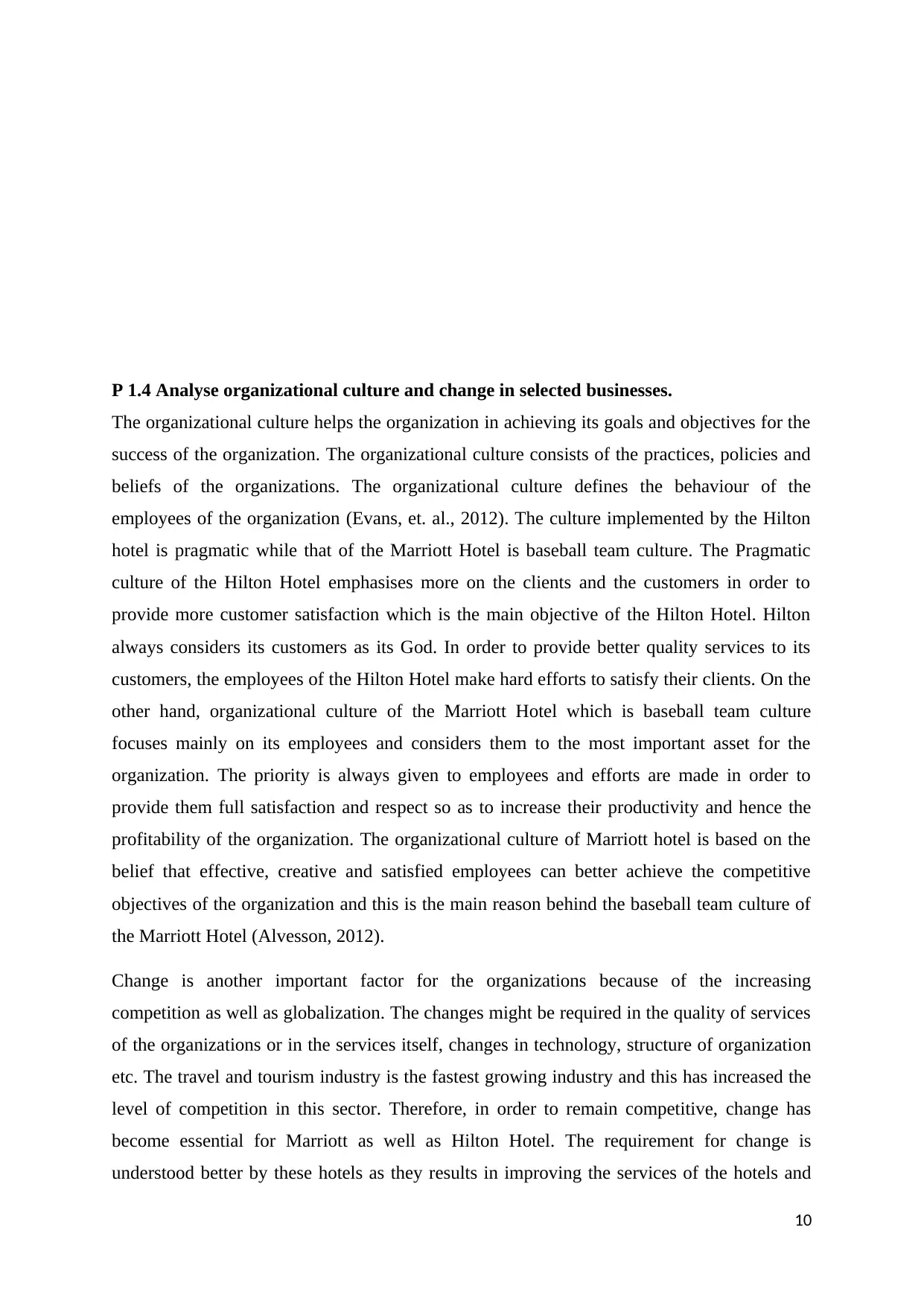
P 1.4 Analyse organizational culture and change in selected businesses.
The organizational culture helps the organization in achieving its goals and objectives for the
success of the organization. The organizational culture consists of the practices, policies and
beliefs of the organizations. The organizational culture defines the behaviour of the
employees of the organization (Evans, et. al., 2012). The culture implemented by the Hilton
hotel is pragmatic while that of the Marriott Hotel is baseball team culture. The Pragmatic
culture of the Hilton Hotel emphasises more on the clients and the customers in order to
provide more customer satisfaction which is the main objective of the Hilton Hotel. Hilton
always considers its customers as its God. In order to provide better quality services to its
customers, the employees of the Hilton Hotel make hard efforts to satisfy their clients. On the
other hand, organizational culture of the Marriott Hotel which is baseball team culture
focuses mainly on its employees and considers them to the most important asset for the
organization. The priority is always given to employees and efforts are made in order to
provide them full satisfaction and respect so as to increase their productivity and hence the
profitability of the organization. The organizational culture of Marriott hotel is based on the
belief that effective, creative and satisfied employees can better achieve the competitive
objectives of the organization and this is the main reason behind the baseball team culture of
the Marriott Hotel (Alvesson, 2012).
Change is another important factor for the organizations because of the increasing
competition as well as globalization. The changes might be required in the quality of services
of the organizations or in the services itself, changes in technology, structure of organization
etc. The travel and tourism industry is the fastest growing industry and this has increased the
level of competition in this sector. Therefore, in order to remain competitive, change has
become essential for Marriott as well as Hilton Hotel. The requirement for change is
understood better by these hotels as they results in improving the services of the hotels and
10
The organizational culture helps the organization in achieving its goals and objectives for the
success of the organization. The organizational culture consists of the practices, policies and
beliefs of the organizations. The organizational culture defines the behaviour of the
employees of the organization (Evans, et. al., 2012). The culture implemented by the Hilton
hotel is pragmatic while that of the Marriott Hotel is baseball team culture. The Pragmatic
culture of the Hilton Hotel emphasises more on the clients and the customers in order to
provide more customer satisfaction which is the main objective of the Hilton Hotel. Hilton
always considers its customers as its God. In order to provide better quality services to its
customers, the employees of the Hilton Hotel make hard efforts to satisfy their clients. On the
other hand, organizational culture of the Marriott Hotel which is baseball team culture
focuses mainly on its employees and considers them to the most important asset for the
organization. The priority is always given to employees and efforts are made in order to
provide them full satisfaction and respect so as to increase their productivity and hence the
profitability of the organization. The organizational culture of Marriott hotel is based on the
belief that effective, creative and satisfied employees can better achieve the competitive
objectives of the organization and this is the main reason behind the baseball team culture of
the Marriott Hotel (Alvesson, 2012).
Change is another important factor for the organizations because of the increasing
competition as well as globalization. The changes might be required in the quality of services
of the organizations or in the services itself, changes in technology, structure of organization
etc. The travel and tourism industry is the fastest growing industry and this has increased the
level of competition in this sector. Therefore, in order to remain competitive, change has
become essential for Marriott as well as Hilton Hotel. The requirement for change is
understood better by these hotels as they results in improving the services of the hotels and
10
Paraphrase This Document
Need a fresh take? Get an instant paraphrase of this document with our AI Paraphraser
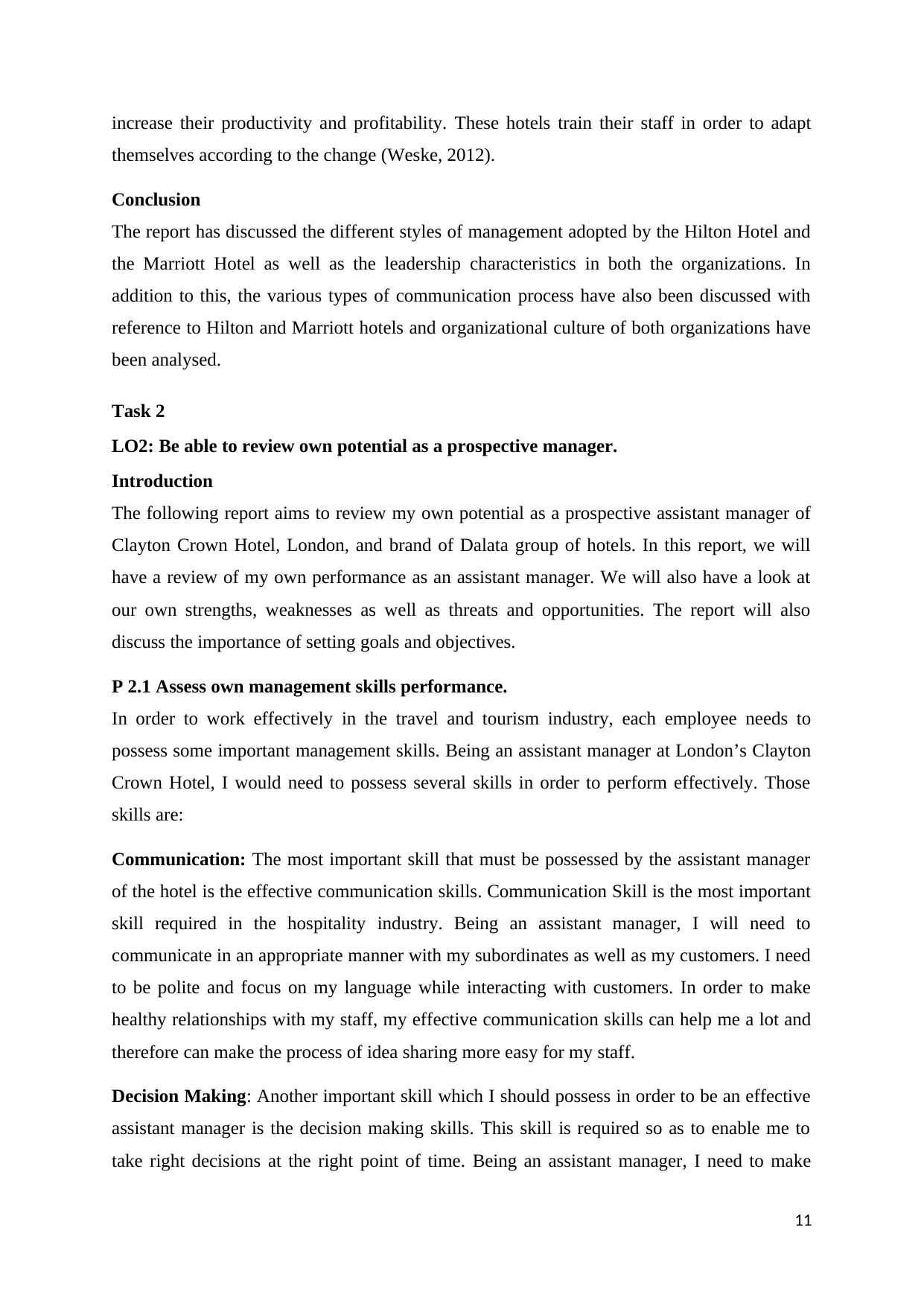
increase their productivity and profitability. These hotels train their staff in order to adapt
themselves according to the change (Weske, 2012).
Conclusion
The report has discussed the different styles of management adopted by the Hilton Hotel and
the Marriott Hotel as well as the leadership characteristics in both the organizations. In
addition to this, the various types of communication process have also been discussed with
reference to Hilton and Marriott hotels and organizational culture of both organizations have
been analysed.
Task 2
LO2: Be able to review own potential as a prospective manager.
Introduction
The following report aims to review my own potential as a prospective assistant manager of
Clayton Crown Hotel, London, and brand of Dalata group of hotels. In this report, we will
have a review of my own performance as an assistant manager. We will also have a look at
our own strengths, weaknesses as well as threats and opportunities. The report will also
discuss the importance of setting goals and objectives.
P 2.1 Assess own management skills performance.
In order to work effectively in the travel and tourism industry, each employee needs to
possess some important management skills. Being an assistant manager at London’s Clayton
Crown Hotel, I would need to possess several skills in order to perform effectively. Those
skills are:
Communication: The most important skill that must be possessed by the assistant manager
of the hotel is the effective communication skills. Communication Skill is the most important
skill required in the hospitality industry. Being an assistant manager, I will need to
communicate in an appropriate manner with my subordinates as well as my customers. I need
to be polite and focus on my language while interacting with customers. In order to make
healthy relationships with my staff, my effective communication skills can help me a lot and
therefore can make the process of idea sharing more easy for my staff.
Decision Making: Another important skill which I should possess in order to be an effective
assistant manager is the decision making skills. This skill is required so as to enable me to
take right decisions at the right point of time. Being an assistant manager, I need to make
11
themselves according to the change (Weske, 2012).
Conclusion
The report has discussed the different styles of management adopted by the Hilton Hotel and
the Marriott Hotel as well as the leadership characteristics in both the organizations. In
addition to this, the various types of communication process have also been discussed with
reference to Hilton and Marriott hotels and organizational culture of both organizations have
been analysed.
Task 2
LO2: Be able to review own potential as a prospective manager.
Introduction
The following report aims to review my own potential as a prospective assistant manager of
Clayton Crown Hotel, London, and brand of Dalata group of hotels. In this report, we will
have a review of my own performance as an assistant manager. We will also have a look at
our own strengths, weaknesses as well as threats and opportunities. The report will also
discuss the importance of setting goals and objectives.
P 2.1 Assess own management skills performance.
In order to work effectively in the travel and tourism industry, each employee needs to
possess some important management skills. Being an assistant manager at London’s Clayton
Crown Hotel, I would need to possess several skills in order to perform effectively. Those
skills are:
Communication: The most important skill that must be possessed by the assistant manager
of the hotel is the effective communication skills. Communication Skill is the most important
skill required in the hospitality industry. Being an assistant manager, I will need to
communicate in an appropriate manner with my subordinates as well as my customers. I need
to be polite and focus on my language while interacting with customers. In order to make
healthy relationships with my staff, my effective communication skills can help me a lot and
therefore can make the process of idea sharing more easy for my staff.
Decision Making: Another important skill which I should possess in order to be an effective
assistant manager is the decision making skills. This skill is required so as to enable me to
take right decisions at the right point of time. Being an assistant manager, I need to make
11
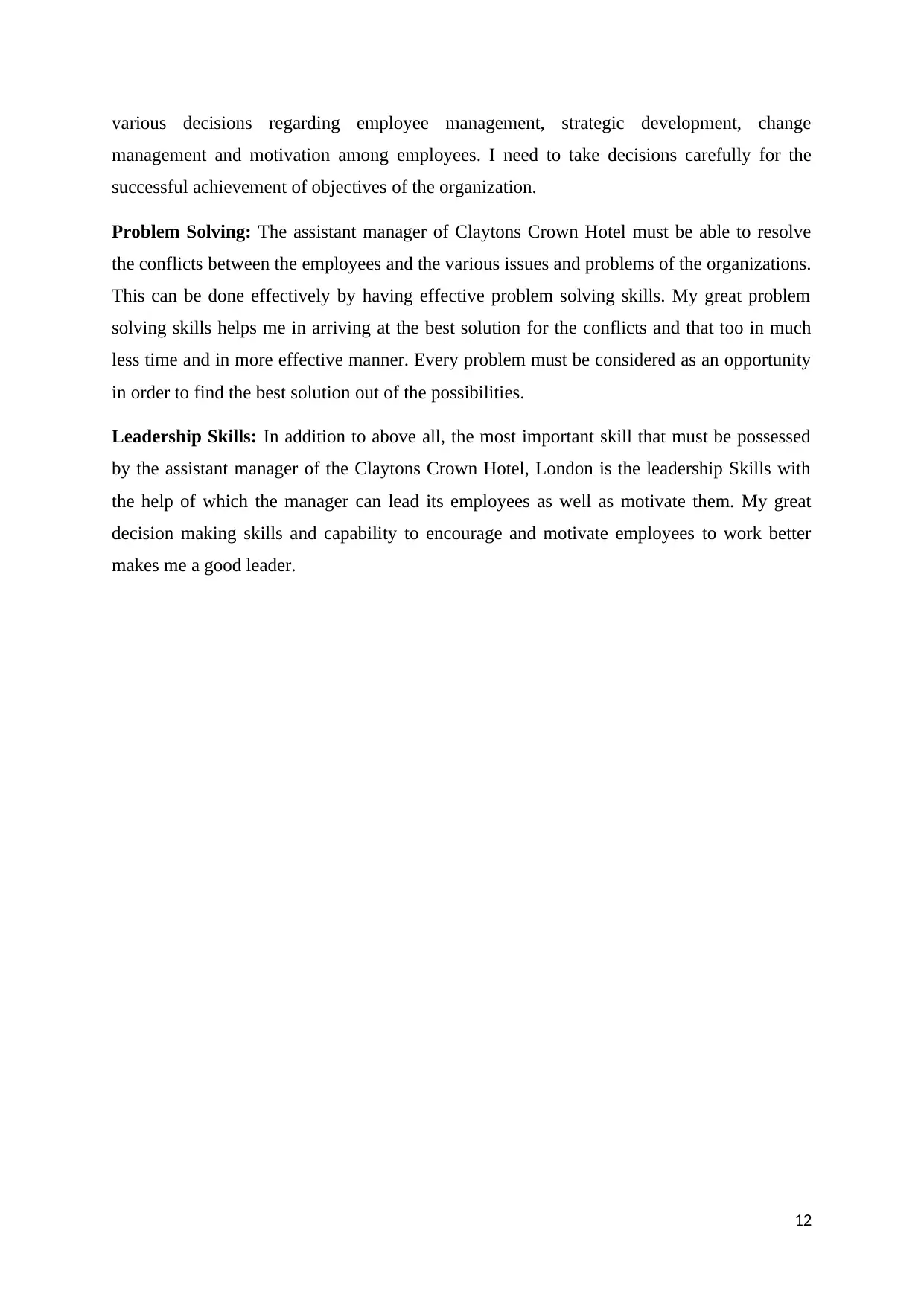
various decisions regarding employee management, strategic development, change
management and motivation among employees. I need to take decisions carefully for the
successful achievement of objectives of the organization.
Problem Solving: The assistant manager of Claytons Crown Hotel must be able to resolve
the conflicts between the employees and the various issues and problems of the organizations.
This can be done effectively by having effective problem solving skills. My great problem
solving skills helps me in arriving at the best solution for the conflicts and that too in much
less time and in more effective manner. Every problem must be considered as an opportunity
in order to find the best solution out of the possibilities.
Leadership Skills: In addition to above all, the most important skill that must be possessed
by the assistant manager of the Claytons Crown Hotel, London is the leadership Skills with
the help of which the manager can lead its employees as well as motivate them. My great
decision making skills and capability to encourage and motivate employees to work better
makes me a good leader.
12
management and motivation among employees. I need to take decisions carefully for the
successful achievement of objectives of the organization.
Problem Solving: The assistant manager of Claytons Crown Hotel must be able to resolve
the conflicts between the employees and the various issues and problems of the organizations.
This can be done effectively by having effective problem solving skills. My great problem
solving skills helps me in arriving at the best solution for the conflicts and that too in much
less time and in more effective manner. Every problem must be considered as an opportunity
in order to find the best solution out of the possibilities.
Leadership Skills: In addition to above all, the most important skill that must be possessed
by the assistant manager of the Claytons Crown Hotel, London is the leadership Skills with
the help of which the manager can lead its employees as well as motivate them. My great
decision making skills and capability to encourage and motivate employees to work better
makes me a good leader.
12
⊘ This is a preview!⊘
Do you want full access?
Subscribe today to unlock all pages.

Trusted by 1+ million students worldwide
1 out of 23
Related Documents
Your All-in-One AI-Powered Toolkit for Academic Success.
+13062052269
info@desklib.com
Available 24*7 on WhatsApp / Email
![[object Object]](/_next/static/media/star-bottom.7253800d.svg)
Unlock your academic potential
Copyright © 2020–2026 A2Z Services. All Rights Reserved. Developed and managed by ZUCOL.

